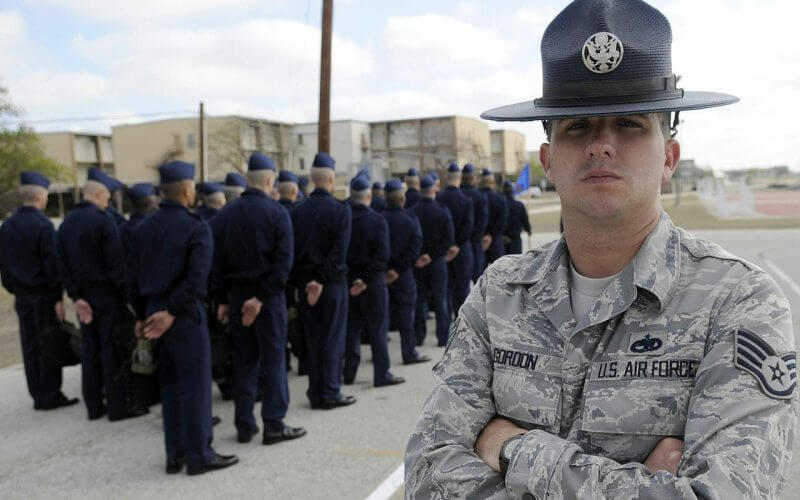The United States Air Force is currently struggling to obtain new airmen for its ranks and will likely miss its active-duty, reserve, and Air National Guard recruitment plans in 2023, Air Force secretary Frank Kendall said this week.
According to reports, Kendall spoke at the Air and Space Force Association's Air Warfare Symposium in Colorado, pointing to the decreased interest in seeking service in the military as one of the primary factors to a projected shortfall that will occur this year concerning new recruitments.
"We are currently projecting about a 10% shortfall this year in the active Air Force and more in the Guard and Reserve," Kendall said at the Air and Space Force Association's Air Warfare Symposium.
"We are swimming upstream against the reduced propensity to serve nationally across the board and a limited percentage of qualified candidates."
According to Michael Rubin, senior fellow at the American Enterprise Institute (A.E.I.) and former Pentagon official, the Air Force "isn't alone in this problem."
"Across the U.S. military, missed goals are becoming the rule rather than the exception. It is not just about tattoos or physical fitness. It really suggests a broader cultural shift across society,” Rubin said.
"Apologizing for if not condemning patriotism in the mass media and K-12 education takes a toll. So too does the impact of politicians increasingly using flag officers as window dressing for politics. The military as an institution is eroding respect," Rubin said to The Foreign Desk.
Last year a Pentagon study found around 77 percent of young Americans would not qualify for military service without having a waiver because of being overweight, drug use, and mental and physical health issues.
Kendall noted that he wanted uniformed members in the crowd to help expand and spread the message about joining the American military services, noting the retention numbers are dire.
"We need this community to help spread the word to America's youth that there are great opportunities in the U.S. military, especially in the Air Force, Space Force in all components: Active Guard and reserve," Kendall said in his speech.
"As evidence of that fact, retention numbers look very good. We're keeping the people that we get, but we need to get more people."
The search to find recruits from the small pool of individuals was around last year, with Major General Ed Thomas, Commander of the U.S. Air Force Recruiting Service, told reporters that the service fell short behind recruiting targets between 1,500 to 2,000 airmen for the reserve and Guard, at the Air and Space Force Association's conference.
Thomas did say that the service did meet its active-duty goals last year, saying that it obtained into its bank of recruits who delayed going into the service. According to reports, the Air Force starts with 25 percent of its security ready to begin training by the start of the year, with individuals signing up the previous year through the delay entry program. The number decreases to 10 percent for the start of 2023, leaving the service needing greater success to find individuals interested in joining the service.
Rubin noted that the Air Force is "conservative with its numbers; The true figures might be higher. What worries me is not year-in, year-out recruiting, but retention. How many commissioned Air Force officers are taking off-ramps in their career to pursue non-military careers?"
Last Week, the U.S. Department of the Air Force declared that it is allowing tattoos on the neck and hands, a policy change aimed at bringing younger talent into the ranks.
"The Department of Air Force is committed to recruiting talented and qualified individuals while retaining the experienced Airmen and Guardians currently serving it," the Department's press release said. "One of the leading barriers currently being tackled is the increased prevalence of hand and neck tattoos among America's youth."
On the subject of the Department's tattoo change, Thomas stated that it will not ultimately correct the recruitment issue.
"While we met our active-duty recruiting goals last year, record-low unemployment rates and steadily declining familiarity with the U.S. military today leaves us uncertain whether we can achieve our goals this year," the General said in the press release.
Thomas noted that the Air Force is seeing some "positive results of our training program, policy changes, and our enhanced marketing efforts, but military recruiting will remain a long-term challenge."
"Tattoos are one thing, but the answer shouldn't be to lower physical or academic qualifications," Rubin told The Foreign Desk.
"Rather, a better path might be to provide tracks for recruitment earlier in high school. Show school children across the country the benefits of staying in school and excelling in STEM. Sponsor after-school programs. If schools do not cooperate, cut them off from federal funding. Recruitment should not just be a one-off at a career fair," he said.
Rubin explained that allowing tattoos on the neck and hands to bring younger individuals into the ranks is less worrying than "any effort to diminish physical or academic standards or ignore criminal records. That said, it is ironic the military will pay for sex changes but will not pay for the removal of tattoos when those rising through the ranks recognize the mistakes of their youth or that being a senior leader means modeling a standard of appearance to which they should aspire," said Rubin.
Rubin noted that what we see is "the symptom, not the disease. We need a quick intervention now; otherwise, the price we will pay down the line will be far greater."
Related Story: Report: U.S. Air Force Too Weak to Confront China









